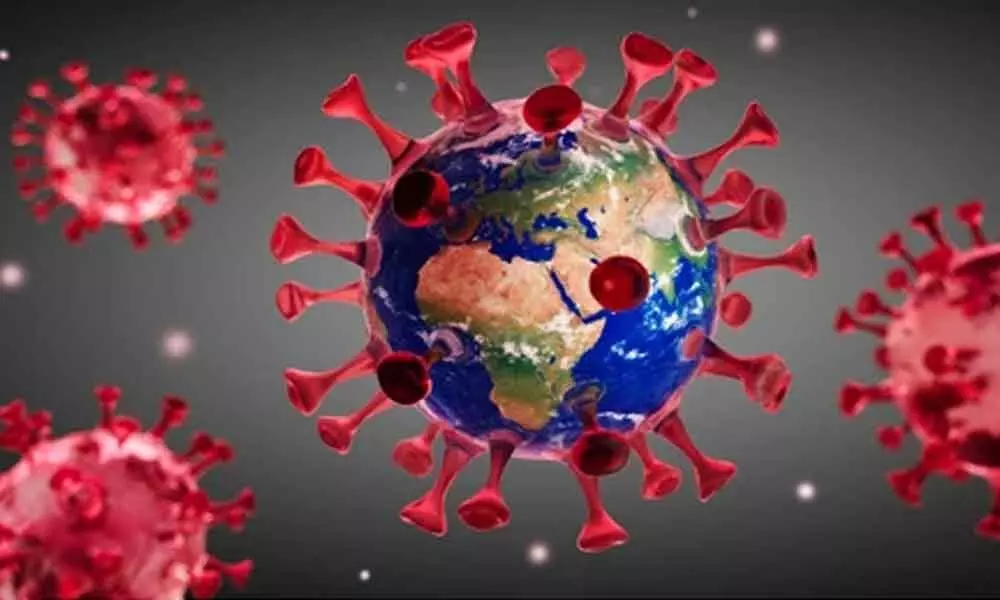Live
- Study Reveals Teabags Release Billions of Microplastics and Nanoplastics, Entering Your Body
- Kumbh Mela 2025: Essential Guide to Comfortable and Respectful Attire for Maha Kumbh
- Hyderabad Real Estate Faces Setback: Property Sales Drop 7% Year-on-Year in 2024
- Gnani’s Gen AI Solutions Revolutionising BFSI
- Trump's WHO threat sparks debate on the efficiency of global health governance
- ICC Champions Trophy 2025 Schedule: India vs Pakistan Match Set for February 23 in Dubai
- Champions Trophy 2025: Full Schedule, Match Dates, Venues, Timings, and Updates
- FRAI Urges Government to Provide Technology Platform for Kirana Stores to Stay Competitive
- Not just Gen Z, millennials too: Redditors discuss the wave of pet parenthood embraced by young Indians
- Innovation can expedite the journey to a Smoke-Free future- in focus at Technovation Abu Dhabi
Just In
New life order emerges as world bounces back from Covid-19


New life order emerges as world bounces back from Covid-19
Governance is another aspect which needs to be reconsidered
As we wrap our heads around the previously unimaginable changes which have taken place in the past year, from the switch to compulsory virtual work to new patterns of social activity while living with the virus, a new world order seems on the horizon. Covid-19 and the consequent seismic changes have made humanity rethink possibly everything— ideas about public health, governance, empathy, resilience, environment, technology and the economy have all been redefined and with reasonable hope and acquired learning from this time of adversity, we can think of a post-Covid world order, where the mistakes of the pre-Covid times are not repeated and our collective existence provides more strength to every member of the human community.
The new world order, almost goes without saying, will have to be heavily premised on technology. Covid-19 and the consequent seismic changes have made humanity rethink possibly everything— ideas about public health, governance, empathy, resilience, environment, technology and the economy have all been redefined and with reasonable hope and acquired learning from this time of adversity, we can think of a post-Covid world order, where the mistakes of the pre-Covid times are not repeated and our collective existence provides more strength to every member of the human community.
The new world order, almost goes without saying, will have to be heavily premised on technology. If there is something which has kept human activity, from socialising to healthcare to education afloat, it inevitably is technological advancement and its innovative deployment. It did not simply provide economic alternatives to businesses and keep people employed, but also facilitated living in extremely altered circumstances.
Artists used technology to broadcast performances, people in isolation used it for recreation and social interaction; universities harnessed it to keep academic sessions and evaluations going. The new world order has to take into consideration, the radical potential of embracing a technology-fuelled life, bridge all digital divides and favourably digitise whatever aspects of human existence can be platformed digitally. This would make trouble in disseminating information, delivery of services and seeking necessary action a thing of the distant past. An example of this would be blockchain technology which enables boundless collaboration facilitating connections across nations and locations.
Governance is another aspect which needs to be reconsidered. As the pandemic showed us, narrow national divisions do not help in a human crisis and countries of the world are undeniably, stronger together. Defining an international coalition for global governance, then, can ensure that our resources are pooled together and allocated to vulnerable constituencies without hassle, vastly reducing the scope of human suffering. It would also enable us to find substantial responses to structural problems, from racism to queerphobia and to build a just and equitable world where environmental concerns are taken care of by a tightly-knit global community.
A white paper compiled by a thought leaders and co-edited by Jane Thomason and Jannah Patchay, 'Covid and the New World Order – Actionable insights from global technology thought leaders', as Forbes reports covers of the macro changes from the impact coronavirus has had on society. Lawrence Wintermeyer comments, "Many of these changes are driven by our seemingly systematic inability to respond effectively to the crisis in government, business, and society. The paper urges a rethinking of the economic system, to rethink what we value, and to rethink how we live."
There is thus a need to rethink the economy itself, and its cycles of demand and supply. We need investment in social infrastructure, a move towards sustainability, action against international tax evasion, just trade deals for developing economies and debt cancellation for poor countries. On the whole, the economy has to be rebuilt for greater coordination and sustained responses to problems of the world and building infrastructure that keeps us afloat in times of unpredictable crises, averting the possibilities of recession. All in all, a human-centered approach to restructure the economy is the need of the hour.
The new generation deserves a reformed world and it is incumbent upon us to progressively make the world better, drawing from our lessons in the realities we currently inhabit. The Co-Covid world is an enormous opportunity for us to reset our collective lives and create a world order that does utmost justice to humanity. A new world is ours to build, and the building blocks are in front of us— the difference shall be made in the endeavour we energise from here.
(The author is Founder, Upsurge Global, and Senior Advisor, Telangana State Innovation Council)

© 2024 Hyderabad Media House Limited/The Hans India. All rights reserved. Powered by hocalwire.com






